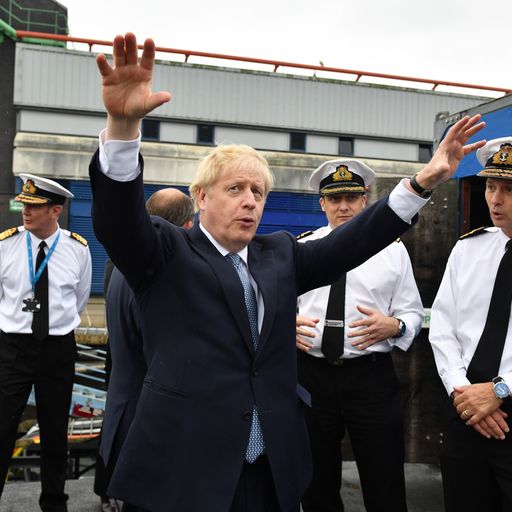Pound plunge: Who are the winners and losers?
The pound has fallen sharply since Boris Johnson became PM. But who is feeling the effects worst and who is benefiting from this?
Tuesday 30 July 2019 11:26, UK
The value of sterling has fallen sharply since Boris Johnson became prime minister.
The pound is trading at levels not seen since early 2017. But who is feeling the effects worst and who is benefiting?
Economists fear the erection of trade barriers at a time when global demand is already being squeezed by the effects of the US-China trade war.
:: More to falling sterling than no-deal Brexit fears
The currency markets are essentially placing bets on the prospects for UK plc. Sterling does better the more investors see a softer Brexit.
Winners, usually, would be exporters as a weaker sterling makes their pound-priced goods and services more competitive abroad.
But Brexit and the trade war have dented activity.
Imports become more expensive - raising the price of many goods and services as higher costs are passed on. It means everyday bills for food and clothing start to rise.
That risks the prospect of higher inflation damaging household spending power with things like oil, priced in dollars, particularly vulnerable to upwards movements.
While it takes time for weaker sterling to feed through to the consumer, those abroad for summer holidays will already be feeling the pinch.
Rates at tourist exchanges, at banks and those attached to card use shift daily to reflect currency movements.
Sterling's weakness against a basket of currencies, including the euro, mean that in-resort spending will cost those abroad more as they get less for their pound.
The biggest problem though is that tourist rates are even weaker - with the euro widely near parity with sterling.
One pound may get you just $1.20 if travelling to the US.
Consumer experts are urging those worried about heading abroad to shop around for tourist rates, check balances regularly and take as much as you can with you to minimise the impact.
The pound is trading at levels not seen since early 2017. But who is feeling the effects worst and who is benefiting?
- Why is it so weak?
Economists fear the erection of trade barriers at a time when global demand is already being squeezed by the effects of the US-China trade war.
:: More to falling sterling than no-deal Brexit fears
The currency markets are essentially placing bets on the prospects for UK plc. Sterling does better the more investors see a softer Brexit.
- Why should I care?
Winners, usually, would be exporters as a weaker sterling makes their pound-priced goods and services more competitive abroad.
But Brexit and the trade war have dented activity.
Imports become more expensive - raising the price of many goods and services as higher costs are passed on. It means everyday bills for food and clothing start to rise.
That risks the prospect of higher inflation damaging household spending power with things like oil, priced in dollars, particularly vulnerable to upwards movements.
- So who are the biggest losers?
While it takes time for weaker sterling to feed through to the consumer, those abroad for summer holidays will already be feeling the pinch.
Rates at tourist exchanges, at banks and those attached to card use shift daily to reflect currency movements.
Sterling's weakness against a basket of currencies, including the euro, mean that in-resort spending will cost those abroad more as they get less for their pound.
- What is the cost to Brits abroad?
The biggest problem though is that tourist rates are even weaker - with the euro widely near parity with sterling.
One pound may get you just $1.20 if travelling to the US.
Consumer experts are urging those worried about heading abroad to shop around for tourist rates, check balances regularly and take as much as you can with you to minimise the impact.


